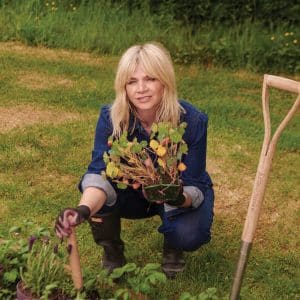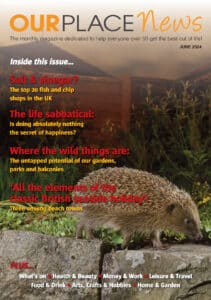The presenter has found out just how important it is to make sure we take some time understanding the wildlife and ecosystems all around us.

The past 18 months have seen so many changes in our lives, but I think we all now have a renewed appreciation for our beautiful outside spaces.
Never has going for a walk and getting out in the fresh air been so important to us all. I’ve been lucky enough to spend some quality time in my garden; planting veggie patches, pottering around in the potting shed and even becoming quite the twitcher, bird-watching from my bedroom.
It’s been a joy to be able to see the changing of the seasons, especially as summer seems to have kicked in for most of us. I’ve found wonder in seeing how the garden evolves throughout the year.
I’ve had the legend that is Monty Don on the Radio 2 Breakfast Show a couple of times and I’ve quizzed him for gardening tips (not just for myself, I promise). I’m still learning and it’s been fabulous to hear from our listeners and their secrets to success. Radio: it’s the best kind of Google.
There’s nothing more relaxing than putting on my overalls, heading to the garden and learning about new blooms, buds and vegetables, in the hope of capturing the spirit of Tom and Barbara from The Good Life.
My friend and Radio 2 colleague Jo Whiley bought me a gardening knife for Christmas and it’s now one of my favourite things. It means serious business and hangs proudly in a prominent place in my shed.
I’m attempting to grow my own broccoli, kale, beetroot and potatoes in raised beds, and the knife has even proved handy when I’m constructing bean frames. What have I become?
Since my love for my garden has taken off, I’ve become involved in Radio 2’s Big Bee Challenge and started to learn just how important it is to make sure we take some time understanding the wildlife and ecosystems all around us. Globally (including the 270 species of bees found in the UK) bees and other wild insects are in decline, with some in danger of extinction due to reductions in the flower-rich habitats they love, loss of food sources and exposure to pesticides.
The bees and their pollination process is vital to our ecosystems, so we must support the bees and other pollinating insects (including butterflies and important-but-slightly-less-sexy hoverflies) to help sustain a healthy environment. The insects also provide the pollination of nearly three-quarters of the plants that produce so much of the world’s food. It truly helps us all. We need them.
From seeing the first of my crocuses and snowdrops flower a few months ago, followed by magnolias and camellias, it’s been so rewarding to plant bee-friendly flowers such as lavender and honeysuckle for summer scents and ice plants or Michaelmas daisies for autumn flowers, to ensure my garden is as welcoming as it can be to bees and their brethren all year round.
I’ve made sure to let some of the lawn grow wild, as there’s nothing better than blooming wild flowers and plants to encourage the bees into our gardens. There’s a special patch of wild daisies in particular that has proved popular with insects, which is lovely to see.
Whether you’ve got a garden, small backyard, tree surround, balcony, window ledge or even a doorstep, nowhere is too small to grow some plants and flowers that will entice bees and plant-loving insects. From planting a herb or flower-pot, to providing water for them, leaving the lawn unmown, creating a bee hotel or taking part in local gardening initiatives, there is something for everyone of all ages and experience levels to try. We had such a rainy May that there’s naturally been containers of water in my garden, but I make sure my bird baths are full in summer and don’t ice over in winter. Even if it’s just a makeshift bee bath with a shallow dish, pebbles and water in – they will love it!
Give bees a chance
Radio 2’s Big Bee Challenge is a brand new, three-year project to shine a light on the plight of our bee population. It aims to raise awareness and encourage listeners to help create a better environment to support our bees and other pollinating insects wherever they can.
We’re asking children aged six to 12 years to design a fabulous bee-friendly garden and the winner’s design will be built by RHS experts at an NHS Trust site which is used by children and young people with mental health needs, giving patients, staff and visitors a peaceful and wildlife-friendly space to reflect.
During the Big Bee Challenge Weekend – 31 July and 1 August – Radio 2 will be encouraging everyone to get involved and do just one thing in their garden, window box or outdoor space to help pollinating insects to thrive. And, as well as lots of programming on-air, you can find out more about bees in a brand new podcast – Bees in a Pod – launching on BBC Sounds, weekly in July.
I know I still have a long way to go, compared to the brilliant horticulturist Elizabeth Lawrence, but I certainly echo her words that: “The hum of bees is the voice of the garden.” Let’s raise that voice, together!
Entries are now open for the children’s Big Bee Challenge design-a-garden competition, closing 6pm on Monday 5 July. The Big Bee Challenge Weekend is on Saturday 31 July and Sunday 1 August.
(Article source: Inews)

